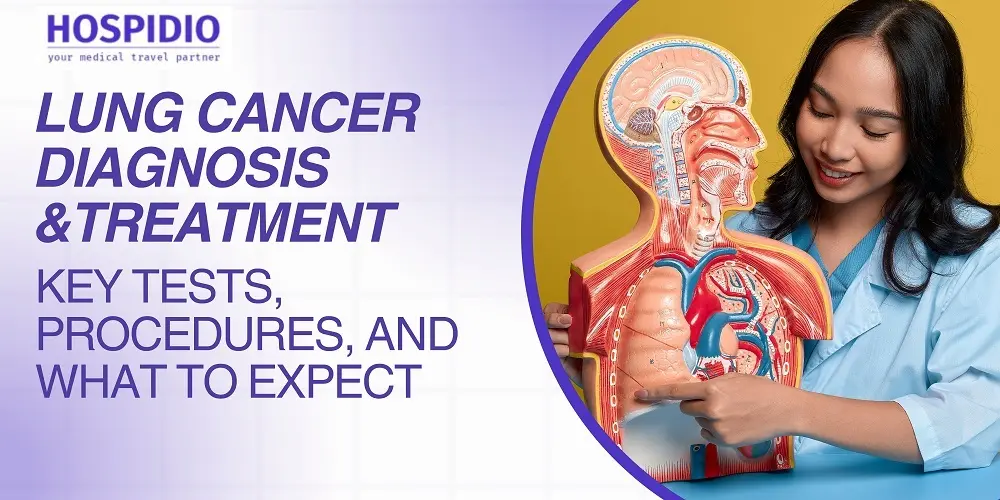Lung cancer is a life-altering diagnosis that can be overwhelming for patients and their families. Early detection plays a critical role in improving survival rates, making it essential for individuals to understand the signs, tests, and treatment options available. This guide walks you through the key diagnostic procedures, treatment approaches, and what to expect during your journey.
Get a free cost estimate
Understanding Lung Cancer Diagnosis
Detecting lung cancer early significantly improves treatment success. The diagnostic process involves multiple steps, including medical history evaluation, imaging tests, and biopsies. Below are the essential procedures:
1. Imaging Tests
Imaging scans help detect abnormalities in the lungs and determine if cancer has spread.
Chest X-ray: A simple and commonly used first test to identify unusual masses or nodules.
CT Scan: Provides a detailed cross-sectional image of the lungs, helping detect even small tumors.
PET Scan: Uses a radioactive tracer to identify actively growing cancer cells and determine if cancer has spread to lymph nodes or other organs.
MRI Scan: Used in cases where lung cancer may have spread to the brain or spinal cord.
2. Tissue Biopsy
A biopsy involves extracting a sample of lung tissue to confirm cancer.
Sputum Cytology: Examining mucus from deep within the lungs under a microscope to detect cancer cells.
Needle Biopsy: A thin needle is inserted into the lung tissue (guided by a CT scan) to extract a small sample for examination.
Bronchoscopy: A flexible tube with a camera is inserted through the mouth or nose to inspect airways and collect tissue samples.
Mediastinoscopy: A small incision is made near the collarbone to access and biopsy lymph nodes for staging purposes.
3. Molecular Testing & Genetic Analysis
Some lung cancers have genetic mutations that make them more responsive to targeted treatments.
EGFR, ALK, and KRAS mutations: These genetic tests help determine if targeted therapy drugs would be effective.
PD-L1 Testing: Measures levels of the PD-L1 protein to assess if immunotherapy would be beneficial.
Treatment Options for Lung Cancer
The best treatment depends on factors such as cancer type, stage, patient health, and personal preferences. Here’s an overview:
1. Surgery (Best for Early-Stage Lung Cancer)
Surgical procedures aim to remove the tumor and surrounding lung tissue.
Lobectomy: Removal of an entire lobe of the lung.
Pneumonectomy: Removal of the entire lung if cancer is extensive.
Segmentectomy/Wedge Resection: Partial lung removal for small, localized tumors.
2. Radiation Therapy
Radiation uses high-energy beams to target and destroy cancer cells. It is often used when surgery isn’t an option or as an additional treatment after surgery.
3. Chemotherapy
Chemotherapy uses powerful drugs to kill fast-growing cancer cells. It can be given:
Before surgery (Neoadjuvant chemotherapy) – to shrink the tumor.
After surgery (Adjuvant chemotherapy) – to destroy remaining cancer cells.
As a primary treatment for advanced lung cancer.
4. Targeted Therapy
For cancers with specific genetic mutations, targeted drugs such as EGFR and ALK inhibitors can block cancer growth while causing fewer side effects than traditional chemotherapy.
5. Immunotherapy
Immunotherapy helps the body’s immune system recognize and attack cancer cells. It is often used for patients with high PD-L1 protein levels or advanced-stage lung cancer.
6. Palliative Care (For Advanced Cancer Patients)
For patients whose cancer is in advanced stages, palliative care helps manage symptoms such as pain, difficulty breathing, and emotional distress. The focus is on improving quality of life rather than curing the disease.
What to Expect as a Patient?
International patients traveling for lung cancer treatment should be aware of the following:
Initial Consultation: A thorough evaluation by oncologists, including medical history, scans, and diagnostic tests.
Personalized Treatment Plan: Doctors will discuss various treatment options based on the type and stage of cancer.
Hospital Stay & Recovery: Surgery often requires hospitalization, while chemotherapy and radiation may be done in outpatient settings.
Follow-Up Care: Regular check-ups are needed to monitor progress and manage side effects.
Emotional & Mental Support
A lung cancer diagnosis can be emotionally challenging. Patients should consider:
Joining support groups for emotional guidance and encouragement.
Speaking with a counselor to manage stress and anxiety.
Family involvement to provide emotional and logistical support.
Final Thoughts: Early Detection Saves Lives
Lung cancer is a serious disease, but with early diagnosis and advancements in treatment, survival rates have improved. If you or a loved one is experiencing symptoms like persistent cough, chest pain, unexplained weight loss, or difficulty breathing, consult a doctor immediately.
For international patients seeking treatment abroad, choosing a trusted medical travel partner can ease the journey and provide access to world-class medical care.
If you have any concerns or need further information on lung cancer diagnosis and treatment, consult a specialist today.
Sasmita
Author
Sasmita is a Marketing Specialist at Hospidio, a leading medical travel company. With expertise in Google Ads, Facebook Ads, and SEO, she plays a pivotal role in driving international leads for healthcare services in India. In addition to her digital marketing prowess, Sasmita is passionate about creating informative and research-based content. She writes extensively about treatment options available in India, the leading hospitals, and the surgeons that provide specialized care. Her blog posts also explore into new medical technologies and breakthroughs in the healthcare field, with the aim of educating international patients on the benefits of traveling to India for medical treatment.
Guneet Bindra
Reviewer
Guneet Bhatia is the Founder of HOSPIDIO and an accomplished content reviewer with extensive experience in medical content development, instructional design, and blogging. Passionate about creating impactful content, she excels in ensuring accuracy and clarity in every piece. Guneet enjoys engaging in meaningful conversations with people from diverse ethnic and cultural backgrounds, enriching her perspective. When she's not working, she cherishes quality time with her family, enjoys good music, and loves brainstorming innovative ideas with her team.

